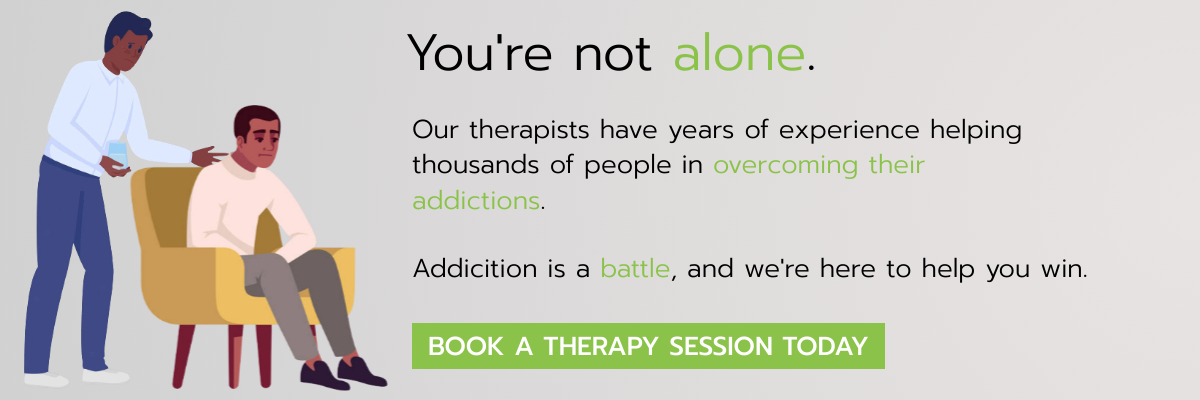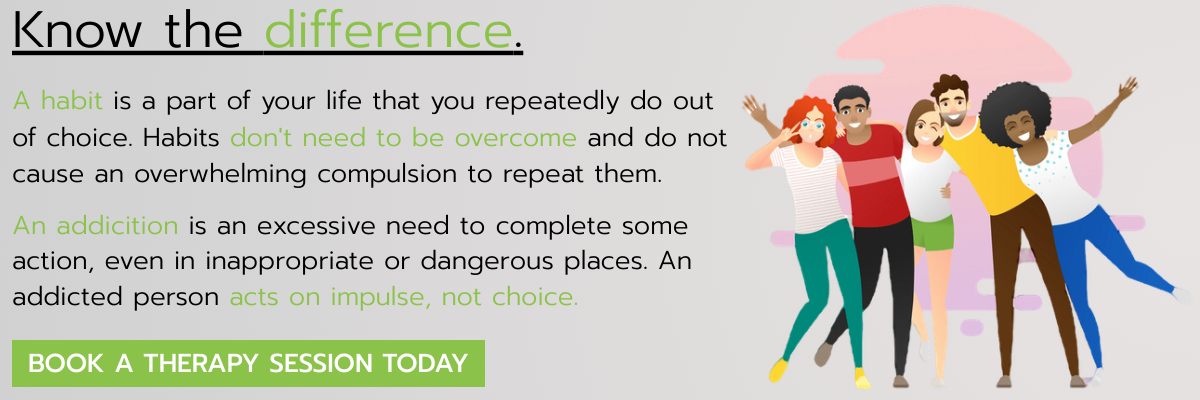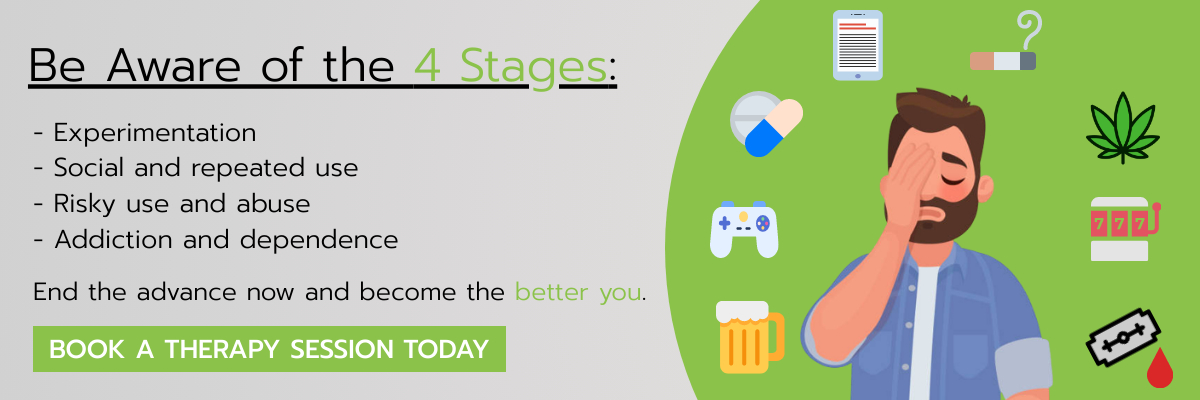20+ Years Experience
Specialist Addiction Therapy

Addiction can be a life-ruining problem. If you are suffering from such issues, or know somebody that is, then the idea of tackling this by yourself can seem overwhelming.
If you are experiencing problems with addictive behaviour or an impulse control issue, then we can offer carefully prepared help that is tailored to your exact situation. Our online addiction counselling services are not just addiction treatments – they are recovery methods.
Many addicts struggle with taking on addiction issues all by themselves, so they rely on third-party treatment and support to overcome their urges. As a professional addiction counselling group, we know how to build the perfect recovery and treatment plan for each client, right down to the specifics of handling their addictive behaviour in September 2025.
We offer addiction counselling Therapy and are more than happy in assisting you on anything you need more information on.
We are a team of qualified online addiction treatment therapists with countless years of total experience in the field.
We have worked with a wide range of recovering addicts to help combat numerous kinds of substance abuse issues, helping each person recuperate in their own way.
We are an experienced, competent, compassionate, and person-centred group of counsellors and psychotherapists who specialise in addiction therapy.
Our work supports groups and individuals struggling with addictions beyond their control or underlying issues that they are not able to combat on their own.
Our wide range of experience has allowed us to provide a range of effective therapy and counselling techniques, all while making sure that our clients are comfortable and recovering healthily.
For many people, the first step towards combating addiction is to seek help – good support can make a significant difference to the recovery process.

We provide the help and assistance needed for the following addictions:
Alcohol counselling is an important part of breaking alcohol-related habits, as well as providing relief from social factors that may lead to heavy drinking. Alcohol addiction treatment is a very serious issue on par with drug abuse and can often involve working to prevent certain dependent behaviors.
Alcohol is still a drug, and there is not much difference between street drugs or alcohol once the addiction takes hold. Physical addiction is a very serious concern, and getting over the withdrawal symptoms can require specialist care – such as the support and counselling that we offer.
Our alcohol counselling sessions will allow a trained alcohol counsellor who has experience treating alcoholism.
Our trained alcohol counsellors help you to stop drinking one on for all, or even just help to curb your binge drinking.
Alcohol addiction therapy can be an excellent source of support to you in recovering from a mental health issue, or offer professional advice in relation to your addictions to alcohol.
Alcohol counselling can be helpful for treatment of alcohol abuse disorders. A counselor can help in your journey to a drink-free life.
Whether you suffer from alcoholism, relapse, or are addict, it’s possible to recover from alcoholism through alcohol therapy. We are here to help you through alcohol dependence
Complete treatment programs are developed for treating the entire individual and usually include physical and psychological treatments including nutritional, exercise and withdrawal management and emotional, mental or spiritual.
People with alcohol addiction can easily tell themselves that there is nothing wrong with them. Therefore the first step towards recovery from alcoholism requires acknowledging the issue.
Various treatment is available for those suffering from alcohol addiction, including remission abstinence, counseling (especially CBT), solitary assistance groups (such as Alcohol Anonymous) or medications.
Counseling provides an opportunity to discuss openly (without judgments) how your drinking relationship is characterised.
A highly effective treatment for drinking is cognitive behavioral therapy or CBT. Typically counselling addresses thinking patterns in the hope that they break emotional or psychological links to habituality.
Through understanding what causes an addictive behavior, alcoholism gradually learns to overcome its urge to drink.
People suffering with addiction can now address all their problems and fears without relying on alcohol. Counselors can be a resource in helping troubled individuals change the way they live.
An alcohol therapist assesses mental health problems associated with alcohol problems. As part of your treatment program and recovery journey, it is always worth speaking to an alcohol counselor as a first step.
Holistic therapy and support groups such as alcoholics anonymous can also address your drinking problem before you consider alcohol rehab.
Addiction to prescription drugs can have serious health consequences and can make a person dependent on factors that seriously harm their bodies.
Treatment needs can vary heavily depending on the drugs involved, with street drugs, in particular, having a very high chance of physical addiction.
Local support groups can help, but we provide specially-prepared care options that are meant to target withdrawal symptoms as well as physical dependency problems. Drug abuse is a very personal thing, and no two addicts require the same recovery process.
Therapy is offered in group or individually based sessions which focus on learning new methods to overcome drug-induced cravings, and this is aimed at tackling other conditions as well as their cause.
Cognitive Behavioural Therapy (CBT) may be useful for people who are addicted to drugs and alcohol because of its ability to understand thoughts, emotions, and behaviour more easily.
If you have drug cravings and are looking for a drug treatment plan, it is always worth considering counselling sessions as part of your drug rehab.
Get in touch today to book your first session with one of our friendly addiction recovery counsellors.
Counseling provides many people with an important role in drug addiction treatment.
Cognitive behavior therapy, family counselling, and others are good tools to help this psychological addiction.
Psychotherapy treats other mental health conditions and may help prevent substance abuse and avoid relapse during your detox.
You can also join a support group such as Narcotics Anonymous which uses group therapy to beat addiction.
You may also be referred to a residential rehabilitation program once you have tried other addiction treatments.
Gambling addiction is just as serious as alcohol or drug addiction, especially among people with addictive behaviours. Gambling can prey on mental health issues or even play off addictions like drugs or alcohol and quickly drain your wallet without you realising what you are doing.
Our gambling addiction counsellors can help you curb your compulsive gambling problem using talking therapies and emotional support.
Since gambling is often tied to mental health concerns or addictive behavior, our qualified therapist teams are able to pinpoint possible causes of your addiction. The best way to combat addictions is to build up behaviour that can prevent them from getting worse.
Gambling is a risky habit that is often difficult to break. Some people will become so dependent that they end up pushing themselves towards a financial crisis and potentially even ill health and wellbeing.
It is possible to stop problem gambling from progressing to this point with the appropriate gambling addiction treatment. Some people find it challenging to admit they are a compulsive gambler and ask for help. Those who do seek help to treat gambling addiction stand a strong chance of regaining control over their lives.
Gambling addiction often misunderstood due to widespread assumptions and the fact that it is a “hidden illness”. It can make it more challenging to comprehend what it means to be a compulsive gambler and possibly lessen the need for immediate gambling therapy. This misconception could also lead people to overlook or avoid the warning signals of gambling addiction in the people they care about.
According to research, up to 2 percent of adults who gamble will experience a gambling addiction. These people will often exhibit various telltale symptoms that point to a problem, including:
If you identify with some of these, you should consider speaking to a gambling counsellor. Denial hinders gambling behaviour from improving, and it’s never too late to stop gambling and regain control.
If you are struggling with gambling urges, it always helps to speak to a specialist gambling counsellor.
Individual counselling can assess your impulse control disorder and ensure you are provided with the right treatment options. They can also recommend alternative therapies and coping skills that act as effective treatment.
Your dedicated counsellor may recommend support groups such as Gamblers Anonymous or additional online support to help with gambling habits.
Speak to a mental health professional today for help treating gambling addiction.
Internet addiction is not just scaremongering.
It is very easy for people with existing mental health issues or a lack of support groups to quickly find themselves obsessed with the internet. This can quickly eat into their work ethic, normal behaviors, or even personal factors like sex drive.
We can provide internet addiction treatment for obsessive internet usage by using tools such as talking therapies.
Therapy is used to fight the behaviour and habits that can build from long-term internet addiction. A person who shuts themselves away from their life may not be able to identify the problem, but we certainly can.
Although internet addiction is not officially a clinical disorder, growing scientific evidence establishes that internet addiction is a major health issue.
Many health experts advise that it should be officially recognised as a clinical problem.
Internet addiction disorder has many subtypes and is mainly characterised by excessive online activities, which would usually result in negative consequences.
Internet addiction includes various compulsive behaviors, such as the following:
Excessive internet use is a behavioural addiction that is seen as an impulse control disorder.
The most crucial first step is to find help from an addiction specialist.
Our addiction counselling treatment has been proven in providing evidence-based treatment for addictions.
We will work together with you to address your internet addiction problem and improve your confidence to make it better for your life. Manor Clinic understands the difficulties that people face in dealing with internet addictions.
While there currently exists no legal system or regulatory framework for counseling for addictions on online websites, we recommend a thorough evaluation by a licensed psychologist.
An accreditation course or qualification is taken during your continuing professional development and also guarantees your counsellor will develop the necessary skills.
As well as other addictions, cognitive behavioral therapy (CBT) is widely viewed as a good treatment option for stopping the addictive habit.
If you are worried about problematic internet habits or time spent online, speak to an internet counsellor.
Like all other addictions, smoking is a product of both behaviour and either physical or psychological addiction. A smoking addict may find it hard to quit after long-term substance use, addicted to the physical sensations that smoking leads to.
We have a lot of experience in handling addictive substance issues, and we know how to provide the right therapy for each addiction. Smoking addiction can sound daunting to treat.
Get in touch with one of our experts to learn about the deeper details of our substance abuse counselling and the recovery treatments we can offer.
On average, two out of three smokers wish to quit.
Numerous methods, like individual behavioral counselling, group behavioural therapy, telephone counselling, and quit helplines, can be used to accomplish this.
The foundation of behavioural therapy is how you act and/or think.
The main goal of modification therapy is to help you quit smoking by altering your thoughts and behaviours for the better.
The group dynamic is used in group behavioural therapy to alter your behaviour.
This type of therapy gives you the assistance of a group who share your issues.
Telephone counselling is readily available, reasonably priced and conveniently private. Because more video conferencing software is available online, it is growing in popularity.
Individual counselling is generally more effective than a less intensive intervention promoting smoking cessation.
Support from others is one of the most crucial factors that will help you succeed (both professional and personal).
If you would like to receive even more information on Addiction Counselling Therapy services, make sure you get in touch with us today!
Sex addictions are often described as having excessive sexual thoughts.
If your need for sex and love has taken over your life and it seems like nothing you do can satisfy it, you may be experiencing a sex and love addiction and might benefit from treatment.
Speak to one of our specialist sexual addiction cousellors today for information on how to treat sex addiction once and for all.
Treatment of compulsive sexual behavior often includes psychotherapy, medication, and self-help groups.
The treatment aims primarily at helping people manage their urges and reduce excess behavior while maintaining their sexual habits.
If you’re experiencing sexually compulsed behaviour, you should undergo treatment. People experiencing excessive and impulsive sexual behaviour often have alcohol or drug addiction and/or other mental health issues that are often treated.
Many people are able to get help in the following ways:
CBT is a type of talking therapy that is frequently used in individual sex addiction treatment. It is an excellent start when addressing the compulsive behaviours and obsessions connected to sex and love addiction.
Dialectical behaviour therapy (DBT) teaches mindfulness, distress tolerance, interpersonal effectiveness, and emotion regulation and can also be used in individual treatment.
Psychodynamic therapy can be used if you have serious self-esteem issues, which may be a part of your treatment strategy. If any childhood difficulties or unconscious memories that may contribute to codependent behaviour and attitudes toward intimacy are discovered, longer-term psychodynamic psychotherapy may be useful.
Getting help from self-help groups is useful when people have excessive sexual activity or have underlying issues it can cause.
Many organisations follow the alcoholic-anonymous (AA) 12-step program. This group may be online, have a local meeting, or both.
You can choose a self-support group with good ratings that will make your life easy. This group may not fit every taste. Ask your counsellor if there’s an alternative support group that you can join.
Some medications are useful for the reduction of psychological reward for behavior and obsessive thoughts or behaviors or for preventing or stopping sexual desire.
Psychotherapy or talk therapy may assist in managing compulsive sexual behavior.
Types of therapy may involve individuals, couples, families or groups.
Habits are parts of your life that you repeatedly do out of choice – fun activities, things to pass the time, and longer-term hobbies. They do not need to be overcome, and they do not cause an overwhelming compulsion to repeat them.

Addiction, by contrast, is an excessive need to complete some action regularly, even in inappropriate or dangerous places. An addicted person is going to seek highs on impulse, leading to behaviours like drinking heavily during the day or smoking far too often.
Addiction treatment is an important step for pushing an addiction back into a habit and then ideally out of a person’s life completely. Whether it is a physical or psychological addiction, an addictive substance or activity can become incredibly disruptive if handled poorly.
There are two core kinds of addiction: psychological and physical.
A psychological addict suffers from issues such as mood swings, anxiety, irritability, obsessive thinking, and other obvious psychological issues when they can’t indulge their addiction. Withdrawal symptoms can also arise quite quickly, often leading to the addict becoming desperate for more.
A physical addict causes more physical signs, including blood pressure changes, a higher heart rate, and physical cravings. Physical withdrawal can lead to issues that seem like some kind of chronic illness but are actually the person’s body becoming more and more agitated as they become unable to fulfil their needs.
Addiction is most common in people who have either mental health issues or existing trauma – things that might cause them to rely on self-destructive comforts like drinking and smoking. Vulnerable young people can also easily fall victim to substance use.
It is important to remember that the limit does not end at just one addiction. Somebody with a serious injury that leaves them bedridden may turn to alcohol as a way to dull the pain, only to also develop a binge-eating addiction due to a lack of other stimulation. A person can be addicted to many things at once, which only increases the health risks.
Addictions are a serious issue for every person. There can be countless reasons why a person might decide to seek help, even if their addiction is comforting to them – for example:
A stagnant career
An inability to bring in more money
Losing friends or family connections due to the addiction
Losing a job
Losing control of oneself too often
Social isolation, or isolation from family
Being the subject of a family intervention
Health issues
Self-awareness about their addiction
Significant distress
Being pressured to attend by family
Illness due to drug overuse
Failed independent self-treatment
Harming family members
Every addict is different, and there can be a whole host of different factors leading to them seeking help. However, the important part is that they are seeking it and that they can accept that their addiction is harmful to both them and the people that they love.
Substance abuse can mean more than drug dependency. Even after the treatment, relapses can be a possibility, and some people will be more susceptible to a relapse than others. Certain psychosocial conditions can trigger the tendency toward relapse: this may cause the urge to use another substance.

Counselling enables you to overcome cravings and cope with life without alcohol or drugs, ending the self-perpetuating cycle that can result from drug reliance or other addictions. We can offer a range of treatment programs to help with substance misuse and abuse.
There are varying ways to treat opioid addiction, but the correct plan should always be one that suits your needs and current substance issues – whether you are a “new” addict or have already relapsed at least once.
A counsellor is your therapist, the source of most therapy throughout your recovery process. Your counsellor can be involved in everything from motivational interviewing to arranging for rehab stays and providing the necessary support and therapy to get you on the right track.
The average cost of addiction therapy is around £55 per session, varying depending on any treatments involved. Of course, this will depend on whether you speak to a psychotherapist, a counsellor, or a psychologist.
You can talk to one of our therapist experts right now to find out how much different therapy options cost and how they can be adjusted to fit around a tight budget.
There are four major stages of drug addiction, all of which lead to the next if left unchecked.
Experimentation
Social and repeated use
Risky use and abuse
Addiction and dependence
The fourth stage is the most extreme and can require rehab and a full detox to cure completely. A medically assisted rehab detox lessens withdrawal symptoms and potential harm, all while nudging you towards full recovery.

Withdrawal at any stage can cause illness-like symptoms until proper treatment.
We allow clients the freedom to choose an alternative counsellor as often as necessary, ensuring that they get therapy from somebody that you are comfortable with and happy to see. Before you start therapy, you (and, if you want, your family members) can have a full telephone assessment prior to choosing your first counsellor.
Counselling and therapy usually begin around seven days after arranging it. Therapy for addiction has no official waiting list because getting clients the help they need is an urgent matter.
This kind of therapy – as well as group therapy and cognitive behavioural therapy – works very well under the right circumstances. However, this method of treatment for things like substance use issues requires compliance and willingness to go through with the therapy.
After getting all the necessary documents out of the way, addiction counselling begins with a private, casual conversation about the nature of your addiction and the behaviours related to it. A therapist takes you through every step of your situation, identifying methods of recovery and potential relapse avenues.
A large part of addiction counselling is focused on creating a plan for recovery, with the first session being heavily dedicated towards that concept. It is a starting point for the rest of your recovery process.
At Addiction Counselling Therapy, we can assist you on the best options available. Make sure you contact us today for a number of great therapy options.

Therapy is for everybody – there is no formal diagnosis necessary.
Cognitive behavioural therapy is the most common kind received by addicts.
Rehab and detox work is often used only as a last resort since rehab can be very restrictive.
The length of a session can influence the overall cost.
Mental health issues are a major cause of addiction, costing £1.6 trillion globally on an annual basis.
If you are looking for a reliable way to treat an addiction – either your own or those of family members-then get in touch today to talk with one of our friendly addiction therapists. Achieving a sober life can be an important goal, and every little bit of help makes a difference.
Contact us, and we will start working on a treatment plan, therapy options, and other important steps. The larger-scale work, like residential rehabilitation or more in-depth treatment, is only necessary when there are no other options.
Here are searches made online when looking for addiction counselling therapists.
addiction anonymous
aa alcoholics anonymous
narcotics anonymous
cocaine anonymous
addiction withdrawal without illness
Resources
For emergency support, please click here for a list of support services.
We are not a crisis support service.
Fully accredited therapists are what people generally look for, and the accrediting bodies are mainly:
The governing bodies are there to identify, develop and maintain professional standards of excellence in Counselling and Psychotherapy.
Make sure you contact us today for a number of great Addiction Counselling Therapy services.
For more information on Addiction Counselling Therapy services, fill in the contact form below to receive a free quote today.
We Aim To Reply To All Enquiries With-in 24-Hours